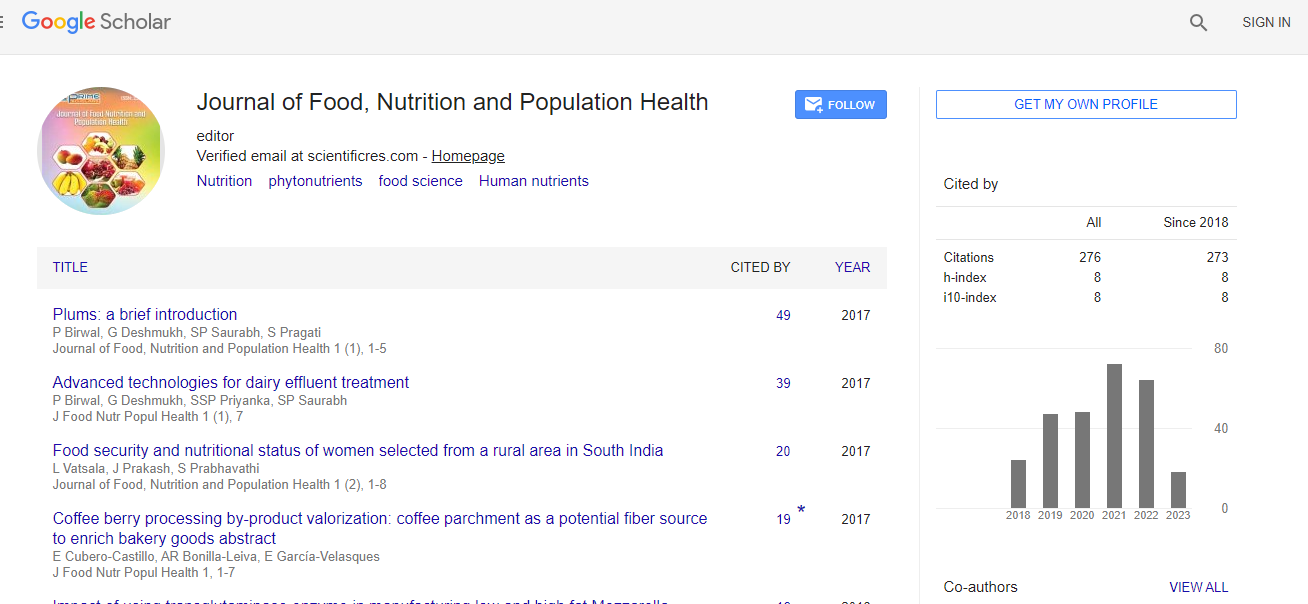Commentary - (2024) Volume 8, Issue 4
Traditional Diets vs. Modern Nutrition: A Comparative Study
Phuong Thi Nguyen*
Department of Food Science, Chinese Academy of Tropical Agricultural Sciences, China
*Correspondence:
Phuong Thi Nguyen,
Department of Food Science, Chinese Academy of Tropical Agricultural Sciences,
China,
Email:
Received: 02-Dec-2024, Manuscript No. ipjfnph-25-22475;
Editor assigned: 04-Dec-2024, Pre QC No. ipjfnph-25-22475 (PQ);
Reviewed: 18-Dec-2024, QC No. ipjfnph-25-22475;
Revised: 23-Dec-2024, Manuscript No. ipjfnph-25-22475 (R);
Published:
30-Dec-2024, DOI: 10.21767/2577-0586.8.4.32
Description
The way humans eat has evolved significantly over time.
Traditional diets, deeply rooted in culture and geography,
have sustained populations for centuries, offering balanced
nutrition through natural and minimally processed foods. In
contrast, modern nutrition, influenced by industrialization
and globalization, emphasizes convenience, processed foods,
and dietary supplements. While modern diets provide easy
access to a variety of foods, they have also been linked to rising
health concerns such as obesity, diabetes, and heart disease.
This article compares traditional diets with modern nutrition,
highlighting their impact on health and well-being. Traditional
diets are dietary patterns developed over generations, based
on locally available ingredients and natural food processing
methods. Modern nutrition refers to contemporary dietary
practices influenced by technological advancements, fast food
culture, and industrial food production. Packaged snacks,
sugary drinks, and ready-to-eat meals with artificial additives.
High in refined carbohydrates, unhealthy fats, and sodium,
contributing to obesity and heart disease. Popularized for
weight loss but sometimes lacking in essential micronutrients.
Reliance on vitamins, protein powders, and meal replacements
instead of whole foods. While modern diets offer convenience
and variety, they often compromise nutritional quality due to
excessive processing and artificial ingredients. Traditional diets
focus on whole, nutrient-dense foods that provide essential
vitamins, minerals, and fiber. Modern diets, especially those
high in processed foods, are often energy-dense but nutrientpoor,
leading to deficiencies and metabolic disorders. Studies
show that populations following traditional diets have lower
rates of obesity, diabetes, and cardiovascular diseases. In
contrast, the widespread adoption of processed and fast
foods has contributed to the global rise in lifestyle diseases.
Traditional diets emphasize fermented foods, whole grains, and
natural fiber sources that support gut microbiota and digestion.
Modern diets, high in artificial additives and low in fiber, are
associated with gut dysbiosis, inflammation, and digestive
disorders. Traditional diets rely on seasonal, locally sourced
ingredients, making them more sustainable. Modern nutrition,
dependent on mass food production and excessive packaging,
contributes to environmental issues such as deforestation,
greenhouse gas emissions, and food waste. Traditional diets
promote mindful eating, home cooking, and communal meals,
leading to better digestion and emotional well-being. Modern
eating habits often involve rushed meals, processed snacks,
and excessive calorie intake, negatively affecting overall health.
To achieve optimal health, a balanced approach is necessary.
Hereâ??s how modern nutrition can integrate the benefits of
traditional diets. Choosing fresh, locally sourced ingredients
over processed foods. Supporting gut health with traditional
staples like yogurt, kimchi, and whole grains. Reducing sugar,
trans fats, and artificial additives in daily meals. Avoiding
rushed meals and focusing on portion control and balanced
nutrition. Utilizing modern knowledge about macronutrients,
supplements, and personalized diets to enhance health without
over-reliance on artificial products. Traditional diets, shaped by
centuries of cultural wisdom, offer a sustainable and healthpromoting
way of eating. While modern nutrition provides
convenience and variety, its heavy reliance on processed foods
has contributed to rising health concerns. By embracing the
nutritional wisdom of traditional diets while making use of
scientific advancements, individuals can achieve a balanced,
nutritious, and sustainable way of eating. The future of
nutrition lies in combining the best aspects of both approaches
to ensure long-term health and well-being.
Acknowledgement
None.
Conflict Of Interest
The author declares there is no conflict of interest in publishing
this article
Citation: Nguyen PT (2024) Traditional Diets vs. Modern Nutrition: A Comparative Study. J Food Nutr Popul Health. 8:32.
Copyright: © 2024 Nguyen PT. This is an open-access article distributed under the terms of the Creative Commons Attribution License, which permits unrestricted use, distribution, and reproduction in any medium, provided the original author and source are credited.

